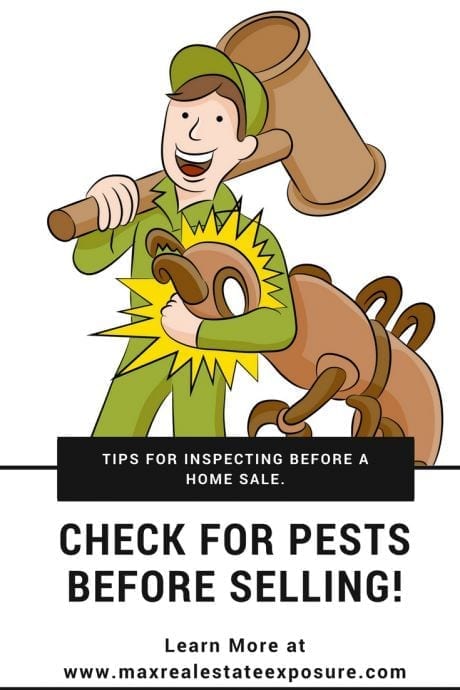 What to Inspect Before Selling Your Home
What to Inspect Before Selling Your Home
Did you know that inspected houses stand a much better chance of getting to closing?
By having a home inspection, you can learn about any existing flaws and remedy them before putting your house for sale.
No rule says you have to inspect your home before you sell it. However, getting a pre-sale home inspection is not a bad idea, especially if you want to get the best possible price.
As familiar as you are with your home, you will often be unaware of issues.
Home inspectors are trained to identify these issues, which can give you a leg up on problems that might kill a sale or seriously devalue your home.
So when a seller asks me, “should I have my home inspected before selling” my answer is usually why not.
The cost of a home inspection is an investment well worth the money.
Understanding what to inspect before selling a home will put you on the right track to a successful sale.
Let’s examine why a home inspection before selling could be wise.
Pre-Sale Home Inspection—Getting Ahead of the Curve
Selling a home can be a stressful experience, even when everything goes right. There is a lot to do, and complications tend to pop up.
While your Real Estate agent can help you navigate the process as well as possible, there is one thing you can do to simplify things greatly—get a pre-sale home inspection.
An inspection will let you know the condition of your home. With this knowledge, you can decide what to fix to maximize your home’s value.
You can also go into the sale fully aware of issues concerning buyers. Knowledge is power, especially in a home sale. Being prepared for a buyer’s home inspection is just plain smart!
Many of the things I mention below are issues that could cause your sale to fall apart. By addressing these common concerns, you’ll increase the odds of not losing a buyer.
An inspected house will give you confidence moving forward. You shouldn’t worry that the buyer’s home inspection will be a significant hurdle to clear.
Even though your house has been inspected, the buyer will likely have a home inspection contingency and their own.
The Most Important Things to Check Before You Sell
While most home inspection advice goes to buyers, it is wise for sellers to have a strong understanding of the process.
Having a home inspection checklist can be essential in knowing what to have inspected. Let’s examine all the potential issues you should be concerned about.
Ensure you ask the home inspector questions about anything you’re unsure about.
1. Mold
Mold is a big concern for buyers. While the verdict is still out on whether minor mold problems in a home genuinely contribute to health issues in anyone other than those with a mold allergy, that doesn’t stop potential buyers from steering clear of moldy homes.
The difficulty with mold is that it tends to hide in places you never go. Attics, basements, crawl spaces, etc. Anywhere that water penetrates the home can become a breeding ground for mold.
Fortunately, mold remediation experts can address the issue fairly quickly. You must know it is there to bring them in to handle the problem.
Knowing that proper measures have been taken to clear up mold will make buyers much more comfortable.
There are not many things that will stop a home sale quicker than mold. Home buyers have put this at the top of the list of things to look for in a home inspection.
Buyers are rarely ever comfortable buying a home with mold. I recommend looking at the sheathing of your roof in the attic. If you see any patchy black areas, consult a mold expert to determine if it is present.
2. Radon
Radon gas can collect in homes with sufficient concentrations of uranium in the soil they are built on. As the uranium breaks down, it releases radon.
Radon has been found in homes all across the country. It can be hazardous to your health and the health of anyone in the home if the concentrations are high enough.
The EPA has set a limit in residential homes of 4 picocuries per liter of air (pCI/L). The testing of radon is relatively simple.
A radon test kit is often left in the home for a minimum of forty-eight hours and then sent to a lab for reading. Anything 4 picocuries or over should be remediated.
There are remediation options for radon in many cases, though, which can be employed before you put the home on the market.
Radon is relatively inexpensive to remediate. You are looking, on average, from around $1000-1500 dollars to lower radon levels, depending on what area of the country you are located in.
Inspected houses won’t have to worry about this issue.
3. Well Water
 Well water is a concern for potential buyers for several reasons. They want to know that the water is safe to drink.
Well water is a concern for potential buyers for several reasons. They want to know that the water is safe to drink.
They also want to know that the well is functional and provides enough water.
Does it have a decent flow rate? No one wants to buy a home and discover that they do not have a reliable source of clean, fresh, safe water.
You can alleviate these concerns by getting the well tested before you put the home on the market.
Typically, a buyer conducts a well test during the home inspection contingency period. The test will include checking the quality and quantity of the water.
If you ever notice that you lose water pressure or run out of water when using multiple water sources, you have a well issue!
While you might have lived with this problem for years, most buyers will not!
A new homeowner will want assurances to shower and run a laundry without losing water.
Buyers are not going to accept a contaminated drinking source either. By conducting these tests before selling, you’ll know they won’t kill your home sale.
It’s worth mentioning that many standard well-quality tests do not check for radon in the water. You have to ask for this to be tested.
I would highly recommend you do so, as many buyers will. Radon found in the water is less common, but it is also far more expensive to correct.
4. Septic System
If you have a septic system, be prepared for buyers to ask questions about it. While a well-cared-for septic system can work great for years, buyers will not take your word for how great the system functions.
Most buyers want a septic system inspected. If the inspection finds issues, you can plan on wanting them addressed.
You can avoid the potential headaches of such a situation by getting the system inspected now. And if there are problems, you can fix them before a buyer steps on your property.
In some states, including Massachusetts, home sellers must test a septic system. In Massachusetts, it is called a Title V septic inspection. The seller must provide the buyer with a clean bill of health. Lenders will not make a loan on a property with a failed septic system.
There are essentially three components to a septic system – the septic tank, the distribution box, and the leach field. All three elements need to be in sound condition during the inspection.
An inspected house without a septic problem will be a significant relief. It is costly to replace a septic system.
5. Pests/Bugs
 Infestations are a significant concern for buyers, especially termite infestations.
Infestations are a significant concern for buyers, especially termite infestations.
Because the signs of such infestations can be difficult to spot, especially in out-of-the-way areas of the home, it is necessary to bring in an inspector to look things over.
Pest control professionals have a variety of effective methods for eliminating pests, so you should be able to address the problem.
If repairs are needed due to the infestations, you can ensure they get done before you list the home.
An excellent general home inspector can check for termites and other bugs. A professional termite company should be brought in for further evaluation if damage is discovered.
6. General Home Inspection
A general home inspection should include a review of your home’s fundamental structural and mechanical features.
Hiring a thorough home inspector should be paramount to make sure you catch any issues. Your real estate agent should be able to provide some excellent references.
Inspected houses will have the following items checked by a professional.
The Plumbing
Buyers will want a functional plumbing system that can be relied on to work well for an extended period of time after they buy the home.
The inspector will check faucets, toilets, sinks, showers, etc., and the pipes accessible throughout and underneath the home.
You do not have to update everything in the home to have it sell, but you must ensure that the actual plumbing is fully operational—no leaks, clogs, pipe degradation, etc.
The Heating and Cooling Systems
The furnace is a primary concern of home buyers, and for a good reason. Replacing an HVAC system is not cheap. Most systems have a lifespan of about 20-30 years, something to consider about your system.
Are you close to the time when the system needs to be replaced? Buyers will be very interested in the condition of the heating and cooling systems, so it makes sense to verify the status now for yourself.
Then you can determine if it is a worthwhile investment to repair/replace the system or if you think you can sell for the price you want without doing so.
Your Realtor can help you judge the best approach.
The Electrical System
The electrical system needs to be not only functional but safe. If your home’s electrical system is old enough, you may encounter issues with buyers who want something more modern and capable of handling the load of their digital lifestyles.
Having an inspector give you the low-down about your electrical system can be quite helpful in planning your sales strategy. You need to fix safety/code issues.
But the only way to know if your current electrical system will be acceptable to buyers is to talk with your Realtor.
The Roof
The roof is a big deal to buyers. It seals the home and protects everything inside, so it makes sense to ensure it is fully functional.
Roofs are also expensive to replace, which is why buyers will want to know the exact condition of your roof before making an offer.
If they have to repair or replace the roof soon, the offer will reflect that. You need to know the exact state of your roof, so you can determine what improvements you want to make before listing the home.
There are usually some clear signs you need a new roof. A professional home inspector can give you a reasonably good idea of how much life is left.
The Foundation
The foundation is another top concern of buyers. A strong foundation is necessary for the home to be livable.
Foundation issues can be costly to fix as well. Many buyers will not want to take on such problems if they can avoid them.
An inspection can tell you what your foundation looks like and what issues you must fix. If problems exist, it will be far easier to take care of them now and sell the home than to take care of them after you get an offer.
While hairline cracks are not typically an issue, significant structural cracking is a different story. Having a clean bill of health on a foundation is a considerable relief to any home buyer.
With inspected houses, you won’t have to worry about structural problems tanking your sale.
Understanding what to inspect before selling your house can save you time and money!Click To TweetInspected Houses Help Simplify Your Sale Later
 Many homeowners take a leap of faith and list their homes without getting them inspected first.
Many homeowners take a leap of faith and list their homes without getting them inspected first.
Sometimes the sale goes through fine. Other times, sellers find themselves with a long list of problems they have to fix before another buyer comes close to their homes.
As a seller, you are better off getting your home checked out before listing.
For a small upfront price, you simplify the sales process and avoid much potential hassle.
Undoubtedly, one of the worst things that can happen as a seller is putting your home back on the market due to a failed inspection.
From that point forward, your real estate agent must explain why the home came back on the market to all future buyers.
Real Estate agents cannot hide problems with a house. Issues discovered during a home inspection must be disclosed to all future buyers.
When I am counseling a seller on what is a reasonable repair request, it always comes down to whether or not the next buyer will expect a repair or not.
Some buyers will be over the top and want perfection. This is not the purpose of a home inspection.
A home inspection is to discover major structural, mechanical, or safety issues. Many buyers and their real estate agents have lost sight of this fact.
You’ll put yourself on the right track to a successful home sale by eliminating significant problems. If a buyer uses an FHA loan, you can also eliminate common problems.
FHA inspection requirements must be met for a buyer to get financing.
Have Your Real Estate Agent Attend The Home Inspection if Possible
One last piece of advice – ask your listing agent to attend the home inspection to represent your best interests. A significant amount of agents do not attend home inspections. The best agents do.
You would not believe the amount of time home inspection issues are exaggerated. Quite often, what the home inspector says and what is put to paper differ.
Your agent should be there to listen and nothing more. They aren’t there to argue with the inspector but to be an observer who understands potential issues.
Final Thoughts on Inspected Houses
Inspected houses stand a much greater chance of closing when sellers take care of significant issues. Inspected homes offer an excellent opportunity for homeowners to understand what they face when a buyer makes an offer.
Speak to your real estate agent about problems that should be fixed or disclosed. With all the substantial issues addressed, you can be more confident your house will go under contract without any hitches.
Additional Helpful Home Inspection Articles
- Pros and cons of sharing the home inspection report – Conor MacEvelly shares expertise about providing a home inspection report to parties.
- Do you need a home inspection – Michelle Gibson provides helpful tips on why home inspections are vital to real estate transactions.
- Putting a house back on the market after an inspection – Kevin Vitali shares guidance on some of the essential things to know when re-listing your home.
Use these additional home inspection articles from other top real estate pros to make sound decisions.
About the Author: The above Real Estate information on Inspected Houses Before Selling: What Sellers Need to Know was provided by Bill Gassett, a Nationally recognized leader in his field. Bill can be reached via email at billgassett@remaxexec.com or by phone at 508-625-0191. Bill has helped people move in and out of Metrowest towns for the last 37+ Years.
Are you thinking of selling your home? I am passionate about Real Estate and love sharing my marketing expertise!
I service Real Estate sales in the following Metrowest MA towns: Ashland, Bellingham, Douglas, Framingham, Franklin, Grafton, Holliston, Hopkinton, Hopedale, Medway, Mendon, Milford, Millbury, Millville, Northborough, Northbridge, Shrewsbury, Southborough, Sutton, Wayland, Westborough, Whitinsville, Worcester, Upton, and Uxbridge MA.

